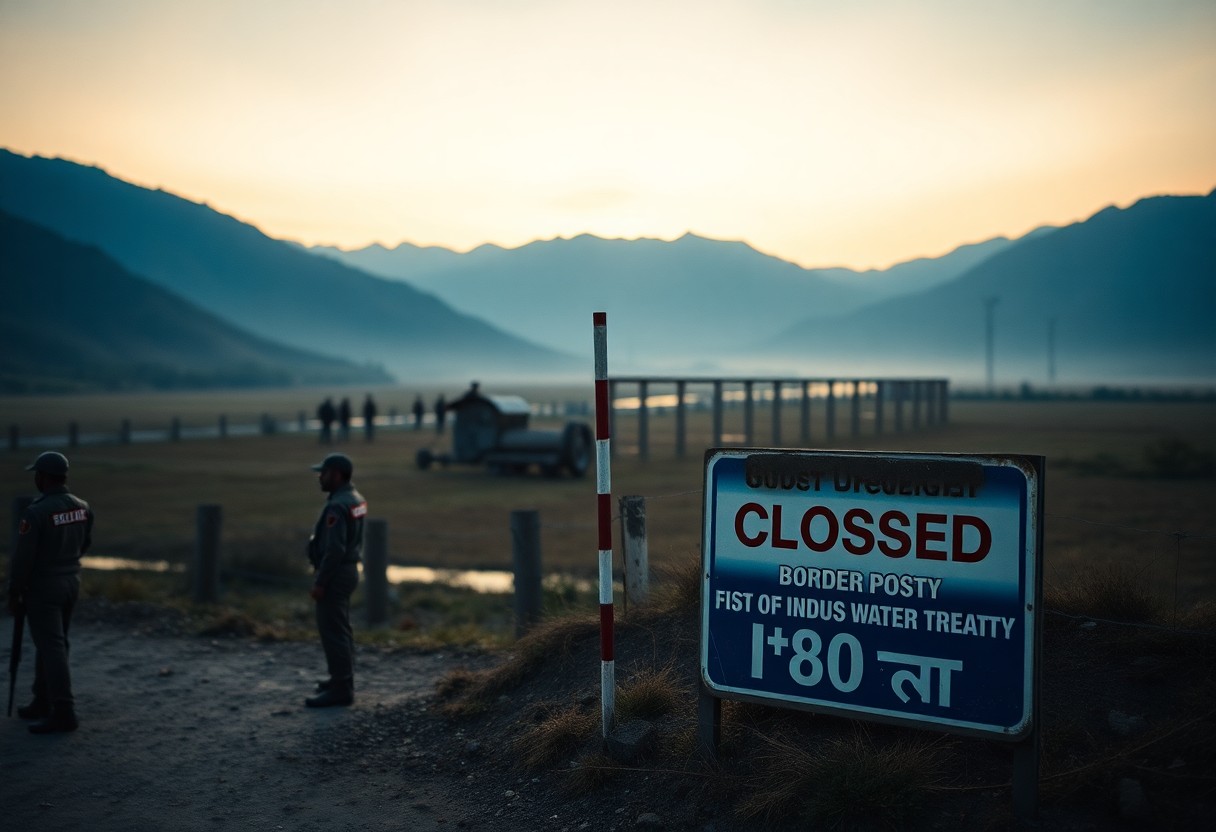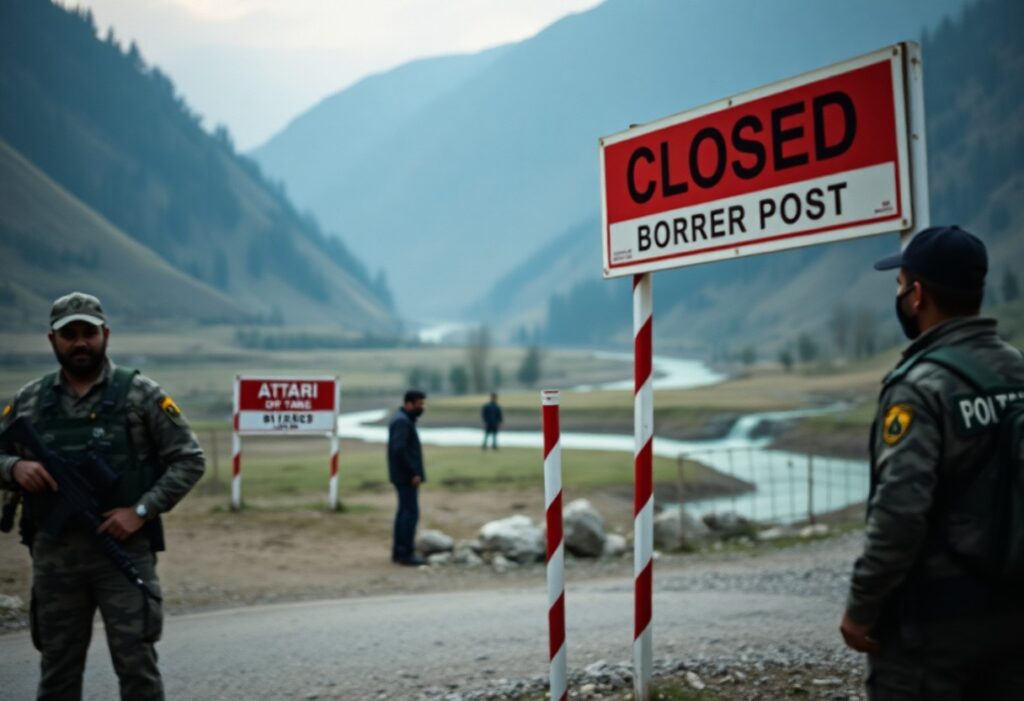In light of the recent tragic events in Pahalgam, you should be aware that India has taken significant steps by placing the Indus Water Treaty on hold and closing the Attari border post. These measures signal a firm stance against cross-border terrorism, emphasizing the country’s commitment to national security. With the foreign secretary announcing these decisions after a high-level Cabinet Committee on Security meeting, it’s vital for you to understand the implications and the broader context of this geopolitical response.
Suspension of the Indus Waters Treaty
Some significant actions follow India’s decision to address national security in response to the Pahalgam terror attack. The Indus Waters Treaty of 1960 will be held in abeyance, reflecting India’s stance until Pakistan can demonstrate a genuine commitment to combat cross-border terrorism.
Closure of the Integrated Check Post Attari
Even more, India has decided to close the Integrated Check Post at Attari with immediate effect. This measure will restrict movement between the two nations as the government reviews security protocols.
It is important for you to note that those who have crossed over into India with valid endorsements will be allowed to return through the Attari route before May 1, 2025. This action serves as a direct response to the current security threats and aims to streamline border control during a tense period.
Cancellation of SAARC Visa Exemption Scheme visas
Attari’s closure extends to the cancellation of all SAARC Visa Exemption Scheme (SVES) visas previously issued to Pakistani nationals. This decision reflects India’s firm approach in the wake of heightened security concerns.
A significant detail you should be aware of is that any Pakistani national currently in India under an SVES visa will have 48 hours to leave the country. This cancellation is part of broader measures to ensure national safety and deter unauthorized entry.
Declaration of Pakistani military advisors as Persona Non Grata
One of the more severe repercussions includes declaring Pakistani military advisors in New Delhi as Persona Non Grata. They will have a week to leave India, signaling a strong message against any threats to national security.
Indus officials at the Pakistani High Commission have been deemed unwelcome in India, emphasizing the country’s resolve to prioritize its safety. By removing these military advisors, India aims to reinforce its stance against terrorism and its sponsors.
Reduction of staff in Indian High Commission in Islamabad
Suspension of diplomatic relations is further exemplified by India’s decision to reduce the staff strength in its High Commission in Islamabad from 55 to 30 members. This reduction aligns with broader strategic measures following the recent attack.
Plus, this staff reduction underscores your nation’s commitment to maintaining a vigilant posture against any potential security threats. By managing the presence of diplomats, India aims to strengthen its foreign policy stance while addressing immediate concerns about safety and accountability.
Directive for heightened vigilance among security forces
Situation following the Pahalgam terror attack has prompted Indian authorities to emphasize an immediate directive for heightened vigilance among all security forces. The Cabinet Committee on Security (CCS) convened under Prime Minister Narendra Modi’s leadership, urging forces to remain on high alert and effectively manage potential threats. This increased vigilance is a direct response to the attack, highlighting the government’s commitment to national security.
Commitment to bring perpetrators to justice
Little doubt remains about India’s unwavering commitment to bringing the perpetrators of the Pahalgam attack to justice. During the CCS meeting, officials resolved to hold accountable those who sponsor and orchestrate acts of violence. Your government is focused not only on addressing immediate security concerns but also on long-term strategies to combat cross-border terrorism.
Vigilance will be key in ensuring that those behind the attack are identified and prosecuted. The determination expressed during the CCS meeting reinforces that the strength of your national resolve lies in a thorough pursuit of justice against terrorist threats and their supporters. This proactive approach promises accountability and aims to dismantle the networks that fuel such activities.
Reference to recent extradition case of Tahawwur Rana
Little has also been said regarding India’s recent success in the extradition of Tahawwur Rana, which underscores the nation’s serious stance against terrorism. The extradition serves as a testament to the government’s resolve in ensuring justice for acts of violence affecting its citizens. Your government is poised to leverage this momentum to tackle other similar cases effectively.
This successful extradition case highlights the collaborative efforts between India and international partners in combating terrorism. Your government’s swift action regarding Rana signals a decisive approach to pursuing those guilty of facilitating attacks. As you navigate this complex landscape, each step taken against individuals involved in terrorism is a step toward maintaining the safety and security of your nation.

Overview of the Cabinet Committee on Security meeting
For over two-and-a-half hours, the Cabinet Committee on Security (CCS) convened under Prime Minister Narendra Modi to review the repercussions of the Pahalgam terror attack. The meeting resulted in significant decisions, including the immediate suspension of the Indus Water Treaty and the closure of the Integrated Check Post at Attari. The committee aimed to strategize India’s response to the heightened security threat posed by cross-border terrorism.
Key attendees and their roles
Overview of the meeting’s attendees highlights the presence of pivotal figures, including Home Minister Amit Shah, Defence Minister Rajnath Singh, and External Affairs Minister S. Jaishankar. Each member contributed to the formulation of robust security measures in light of the recent attack, emphasizing their collective commitment to national safety.
Understanding the roles of key attendees offers insight into the decision-making process. Prime Minister Modi led the discussions, while Home Minister Shah provided updates on the attack. Defence Minister Singh and External Affairs Minister Jaishankar focused on military and diplomatic responses, respectively. National Security Adviser Ajit Doval played a crucial role in assessing security strategies, helping ensure a cohesive and comprehensive response to the incident.
Discussion points focused on the aftermath of the attack
You can see that the discussion points during the CCS meeting were centered on addressing the ramifications of the attack. Key measures included holding the Indus Waters Treaty in abeyance and reducing governmental personnel in both countries’ high commissions. These actions were deemed necessary to signal India’s seriousness in combating terrorism.
It’s clear that the discussions were not only reactive but also strategic. The CCS stressed that perpetrators would face justice, and their backers would be held accountable. This commitment reflects India’s unyielding stance against terrorism, exemplified by past extradition efforts, ensuring a robust and relentless approach in safeguarding national security moving forward.


